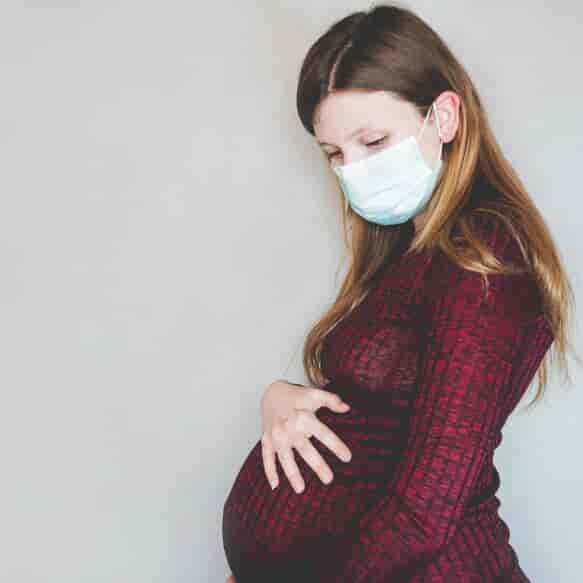
The CDC advises that pregnant people with COVID-19 are at increased risk for severe illness due to COVID-19, as well as “other adverse outcomes, such as preterm birth.” Because of these risks, most doctors will advise pregnant women to take special precautions to protect themselves and their babies by limiting interactions with people who may have been exposed to COVID-19; by wearing a mask; and by social distancing.
When these precautions aren’t possible at work, many doctors will advise their pregnant patients to work remotely. If this isn’t possible, doctors may advise you to take off work until you have your baby.
If this happens, does your employer have to accommodate you? Can your employer fire you for requesting accommodations or taking leave? While the answer depends on your specific situation, in California, you likely have the right to accommodations and job-protected leave. That means if you are fired for requesting or taking COVID-19-related leave as a pregnant worker, you may have a claim for wrongful termination.
Your Rights to Leave Under the Families First Coronavirus Response Act (FFCRA)
The FFCRA requires certain employers to provide employees with paid sick leave or expanded family and medical leave. The Department of Labor has issued rules implementing the FFCRA. Unfortunately, these rules were enacted in a rush and their protections have a huge number of exceptions and carve outs—for example, employers smaller than 50 people were not required to comply, and neither were employers bigger than 500 people—in addition to allowing employers to pry into the reasons for your leave. These rules are also due to expire on December 31, 2020 unless they are extended. You can see whether you are eligible for FFCRA leave here.
Put differently, if you are a pregnant worker looking for protections, the FFCRA probably does not provide you with meaningful accommodations or protections. Fortunately, California law provides more robust rights to pregnant workers. While these laws aren’t COVID-specific, they can be applied to protect pregnant workers’ right to disability leave, family or medical leave, and workplace accommodations.
Your Right to Accommodations Under the California Fair Employment & Housing Act (FEHA)
First, you should ask whether you can continue to safely work with accommodations. If you can, your employer may have the obligation to accommodate you under the Fair Employment & Housing Act (FEHA), which applies to all employers with more than five employees.
Under FEHA, employers must engage in the “good faith interactive process” to determine whether they can accommodate pregnant workers’ work restrictions, which would include restrictions based on vulnerability to severe illness due to COVID-19. Your employer must grant you “reasonable accommodations” that do not pose an undue burden on their business. This is a fact-specific determination and you should talk to an experienced employment attorney if you have questions.
Your Right to Leave Under the Pregnancy Disability Leave Law (PDLL)
Pregnant workers in California are entitled to leave under the Pregnancy Disability Leave Law (PDLL) if their employer “regularly employs” five employees. You are not required to have worked for any minimum length of time (as compared to under CFRA or the FMLA, which are discussed below) to qualify. You are entitled to a “reasonable” amount of leave, defined as up to four months, under the PDLL. Your employer may require medical certification at the time you request PDLL or within a few days after. (They cannot require certification in the middle of your leave.) Because these rules are complicated, the law requires that your employer provide you with formal notice of your rights under the PDLL.
Leave under the PDLL is “job-protected,” meaning your employer must reinstate you to the same position or a comparable position at the same rate of pay. You may request, and your employer must provide, this guarantee in writing. When you return from leave, your employer must reinstate you unless a narrow set of exceptions apply (e.g., they went out of business).
Leave under the PDLL is also paid at a percent of your regular pay rate through the State pregnancy disability leave program. Your employer does not need to pay you.
If you use pregnancy disability leave before giving birth because you cannot safely continue to work, this would reduce the total amount of pregnancy disability leave you are entitled to after your baby is born.
Your Right to Leave Under the California Family Rights Act (CFRA)
The California Family Rights Act (CFRA) currently requires any employer with 50 or more employees within 75 miles of the employee’s worksite to grant up to 12 workweeks of leave to care for themselves, a child, a parent, or a spouse. As of January 1, 2021, CFRA will cover all employers with more than five employees. This new change will extend the right to job-protected leave to hundreds of thousands of workers and provides significant protection to pregnant women whose doctors take them off work for medical reasons during the COVID-19 pandemic.
CFRA leave is unpaid. However, it is “job-protected,” which means that your employer generally cannot terminate you while on leave, and must reinstate you to your same position and pay rate when you return. (Exceptions may exist when your employer is genuinely eliminating positions or terminating their business, which unfortunately does happen due to the economic turmoil caused by the pandemic.)
If you use CFRA leave before giving birth because you cannot safely continue to work, this would reduce the amount of CFRA leave you are entitled to after your baby is born.
Talk to an Experienced Employment Lawyer to Understand Your Rights
Leave laws are complicated, and the new COVID-related leave laws are even trickier. If you are struggling to understand your rights as a pregnant worker, contact our experienced, compassionate pregnancy discrimination and employment attorneys for a free case review. You don’t need to navigate this situation alone.

